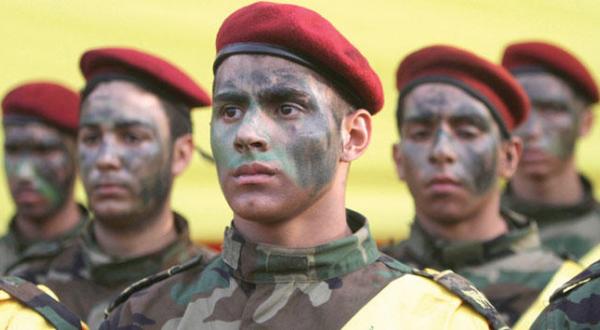
Iran-funded Hezbollah members, which is held responsible for provoking relationships between Saudi Arabia and Lebanon and spurring sectarian strife-AP
Riyadh- Lebanese politicians have long cautioned of the consequences of Hezbollah’s methods, especially going too far when targeting Saudi Arabia. Riyadh always lent out a helping hand to Lebanon, which is a country severed by partisanship. Riyadh has taken a decision to halt its military support for the Lebanese army and security forces, yet it made sure to not go as far as taking decisive diplomatic measures like the ones it had took with Iran.
The Lebanese Minister of Foreign Affairs, Gebran Bassil, reflects the deteriorating state of the Lebanese decision-making mechanism. FM Bassil had abstained from voting at the Arab League ministerial session, which condemned Iran and supported Saudi Arabia in its stance against Iranian interventions. FM Bassil chose to object on linking “the Lebanese Hezbollah to terrorist activities”, and portrayed himself as an Iranian defense lawyer at the Arab League session.
Hezbollah in Lebanon, what some political observers refer to as Iran’s fifth column, always works on complicating the solutions for the political crisis, presidential vacuum and parliamentary inefficiency, that Lebanon has been facing for over a year and a half now. Hezbollah constantly aims at keeping Lebanon misaligned with the Arab and Muslim world that is being led by the Kingdom of Saudi Arabia and accepted by Muslim nations.
Since 1989, Hezbollah has refused the Taif Agreement and was kept from participating in any of the governments established during the period of the “Syrian custody” over Lebanon. Yet, after the former Prime Minister Rafic Hariri was assassinated, the road was clear for Hezbollah to take on a broader regional role. They also kicked off their contribution to the Lebanese parliament which was self-controlled and had never granted any of the Saad Hariri established governments trust. Hezbollah’s first parliamentary representative Trad Hamadeh was assigned on April 2005. He was also appointed to the Republic of Lebanon Ministry of Agriculture during Najib Mikati’s administration.
Hezbollah, since ten years ago, had aimed at overruling the Saudi-sponsored Taif Agreement. The agreement had Lebanon avoid several crises by putting in the 1/3 fraction on decision-making instead of the previous system which split the process by half among Muslims and Christians. When Hezbollah attempts to compromise the agreement, its only target is to hammer down the Musilm Sunni force especially and Christians generally.
With Hezbollah’s tightening grip on legislative, executive and judicial decisions in addition to continuously dedicating itself to issuing a new constitution for the republic, aimed only at handing down Lebanon to Iran, MP Marwan Hamadeh said that Lebanon and Saudi Arabia have had more than enough with Hezbollah always putting a spoke in the wheel.
Lebanon’s vital interests are threatened as long as Hezbollah represented in the government, considering the Saudi taking out the grant as a bell ringer reminding the Lebanese of their best interest, their fate, Arab identity, and commitment to it according to the Taif agreement, MP Hamadeh clarified to Asharq Al-Awsat that. The withdrawal of Saudi support should prompt the Lebanese not to give Iran a share in Lebanon’s governing.
Hamadeh had asked the current Lebanese government to resign and be replaced with a caretaker government substitute in order to keep Lebanon from facing more predicaments. He pointed out that the government and FM Bassil have been transformed into a cover-up instrument for Hezbollah’s intervention in Syria, despite the ministerial statement which stipulates the self-reserve approach. Hamedeh put forth the question on how could other Arab countries trust Lebanon, especially with day-by-day Hezbollah’s crimes in Syria, in addition to Hassan Nasrallah’s consistent attack on a world-wide Muslim sect.
Saudi Arabia’s role in Lebanon is center-located, it always heads in the direction of supporting Lebanon during its times of crisis and is bent on guaranteeing its stable political life. History before, and till this day Saudi Arabia has participated with reinforcing security around many diplomatic facilities and distributing relief aid across a number countries, within the frame work of the League of Arab States (LAS) .
